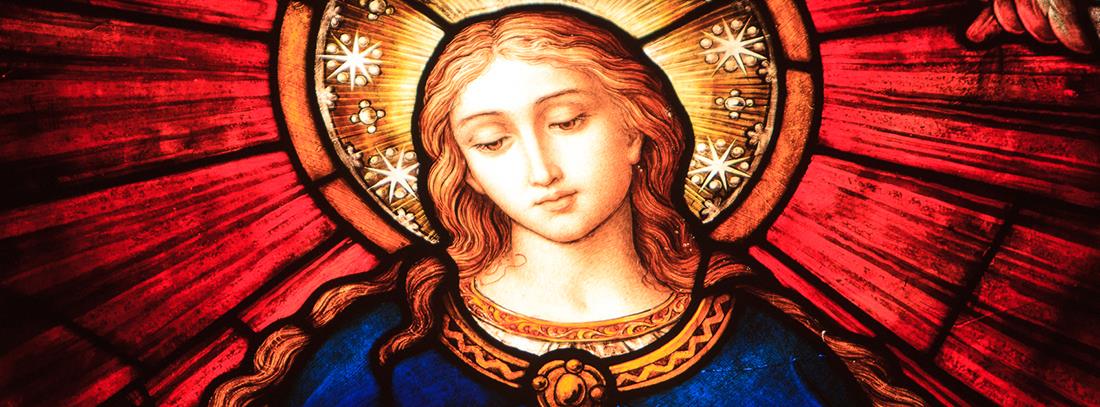
Originally Published: September 1950
Author: Fr. James McMillan, SMM
This is the third of a series of articles focusing on Mary by Fr. McMillan, SMM.
This picture was taken of the stain glass window from the Cathedral Basilica of the Immaculate Conception in Mobile, AL. It is also used on the cover of the latest translation of The Secret of Mary.
DEVOTION TO MARY, as we have pointed out, is based on the fact that she is the Mother of God and the Mother of all men, that everything we receive from God comes to us thru Mary. Without her cooperation we can never be redeemed, without her interceding for us before the throne of God, no one can ever receive the smallest grace. In other words, Mary is Necessary for our salvation. Without her we cannot be saved.
Such is the plan of God for the redemption of mankind. To put it simply, God has chosen to make Mary necessary to man that he may be able to work out his salvation,
But Montfort does not merely say that Mary is necessary to man. He goes further than that, and speaks of her as being necessary to God. “The most Holy Virgin being necessary to God by a necessity which we call hypothetical, in consequence of His will, she is far more necessary to men, in order that they may attain their last end.” (TD. no. 39) Here we shall try to understand what he means exactly when he says that Mary is necessary to God.
NECESSARY TO GOD?
Montfort says that Mary is ”necessary to God by a necessity to God we will call hypothetical.” Obviously, the word “necessary” must not be used lightly in connection with the omnipotent God-head. Strictly speaking, God has no need for any creature, Our Blessed Lady included. He could have become man without her. He had no absolute need of a human mother. But the fact is that He chose to depend upon her consent and cooperation in the work of the Incarnation and Redemption. And that is what St. Louis de Montfort means by a hypothetical necessity.
This “hypothetical necessity”, as de Montfort calls it, is something that occurs frequently in everyday life and is not so cryptic and mysterious as it sounds. It is a technical theological expression which our Saint uses to convey an idea that is simple in itself.
For example, if a man decides to build his house of wood, then it is hypothetically necessary for him to use wood. If he decided to take a drive in his car, then in that hypothesis he has no choice but to use the car. Since he has chosen to build a wooden house, or to drive his car, it is clear enough that in the circumstances he no longer has any Choice in the matter. For he cannot very well have a wooden house without wood, or drive a car without using it. Now there is no absolute necessity in either case. He can just as well build his house of stone or brick; and he can walk or take the bus or even roller skate to wherever he is going. A means is absolutely necessary if it is impossible to attain the end without it. It becomes hypothetical necessary if it is the means of someone’s free choice.
It is in this sense that St. Louis says Mary was neccessary to God, and that God depended upon her in the Incarnation and Redemption. He could have become man without her or any other creature. He could have appeared in the world as a grown man or a child, entirely independent of a mother. But He saw fit to be born into this world, and chose to be born of a woman whom He predestined from all eternity to be His Mother, a woman He adorned unspeakable gifts of beauty and grace, immaculate in her conception, with a purity and spotlessness surpassing that of the angels. And when the time had come, He sent His messengers to ask her for her consent to be Mother of God.
We are devoted to Our Lady because she is necessary to us in order that we may obtain the grace of God and work out our salvation. But the fact that we need Mary is only a consequence, according to de Montfort, of the fact that she was necessary to God, in the way we have just explained. This is a conclusion which we shall try to establish in a subsequent issue. For the present, we have only to ponder the magnificent plan of God in making Himself dependent upon a mere creature – the most perfect of all creatures, no doubt – but still one whose perfections are as nothing compared to the all-powerful and all-sufficient Creator.
For us, it is a lesson in humility which we can never fully understand, and which lays bare all the ugly pride of those who would have us thrust Mary aside as unimportant or as an impediment to union with God. It is also a lesson in Christian perfection, in being God-like, in conforming our way of acting to that of Our Savior, “Who had a boundless desire to glorify God… and found no more perfect means to do it than to submit Himself in all things to the Blessed Virgin.” (TD. no. 139)


